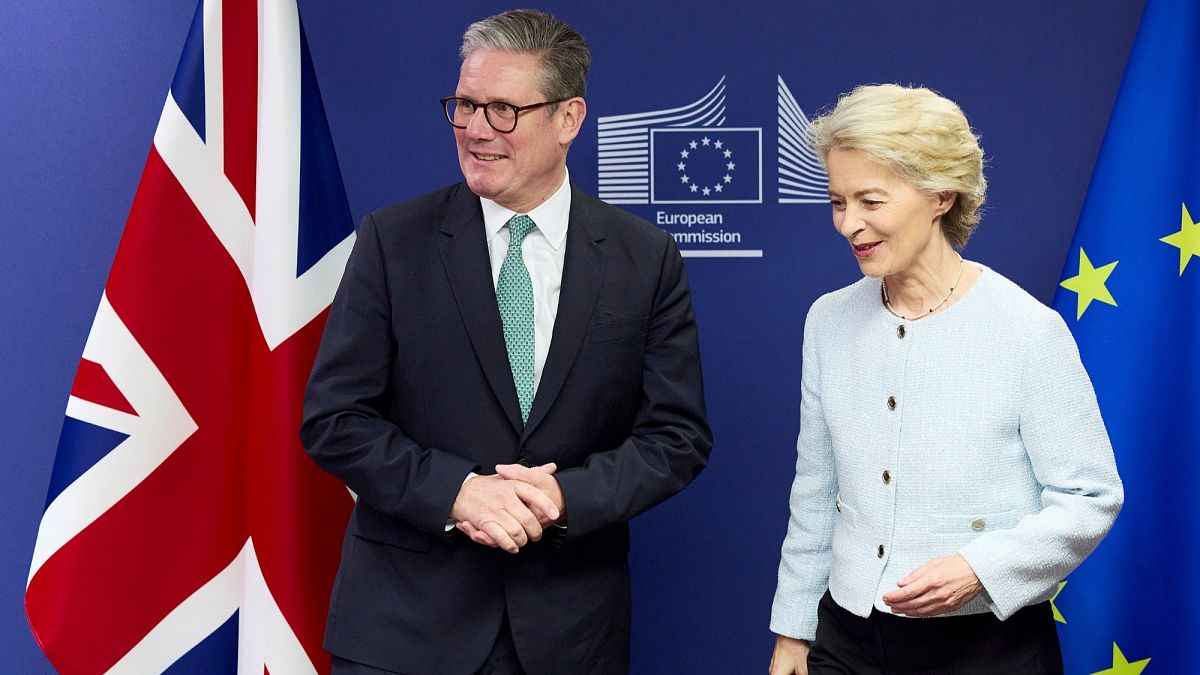Britain’s defence industry is urging the EU and UK to strike a security pact as early as next month and not to make it conditional on a wider reset, so it can access a new €150 billion European instrument to ramp up defence spending.
In a letter addressed to British Prime Minister Keir Starmer, European Commission President Ursula von der Leyen, and European Council chief Antonio Costa, the heads of the UK’s main aerospace, industry and tech associations say a security pact “must be a central deliverable of the upcoming UK-EU summit” to be held in London on 19 May.
“Such an agreement would be instrumental in building a strong European industrial and technological base, fostering a pragmatic and inclusive EU defence ecosystem, and enabling the active participation of UK industry in EU-led defence initiatives.”
“This would be a crucial step towards enhancing Europe’s collective security, industrial resilience and global competitiveness,” ADS, an aerospace and defence trade association, the British Chambers of Commerce, and TechUK, also write in the letter seen by Euronews.
Starmer, who came to power last summer, has been pushing for a security and defence pact which he had previously said should focus on research and development, military mobility across Europe, greater cooperation on missions and operations, and industrial collaboration.
Since then, the Commission has presented a “Readiness 2030” plan to boost defence spending and joint procurement across the bloc to the tune of €800 billion over the next four years, with some €150 billion, to be raised on the market by the Commission and handed out as loans, contingent on a so-called European preference.
This would mean that suppliers from non-EU countries that are not part of the single market or already have a security pact with the bloc would only be able to benefit if their contribution doesn’t exceed just over a third of the defence product being bought.
That would apply to British and Turkish manufacturers while those from Norway and Iceland can already fully participate.
Striking a security pact requires the unanimous approval of all 27 member states, but some countries, like France, have already signalled they want any such partnership to be included in a wider reset in relations, seemingly returning to the Brexit mantra that ‘nothing is agreed until everything is agreed’.
Some of the areas Brussels and London still need to finalise discussions on include fishing, citizens’ rights, youth mobility, and phytosanitary rules. Current rules on fishing will expire in June 2026.
Peter Bell, the vice president of the British Chamber of Commerce EU, said in a statement accompanying the letter that “given the security context in Europe, it is essential that the UK and EU urgently deliver an agreement on defence and security with robust industrial dimensions at the upcoming summit.
“Negotiations cannot be protracted by horse-trading on less critical issues,” he added.
Kevin Craven, from ADS, meanwhile said that “the longer this process takes, the less likely we are to be able to respond to emerging security threats – despite having the capability, the political will and the moral duty to do so”.
Contacted by Euronews, Britain’s Cabinet Office said that next month’s summit will “cover a range of UK-EU issues as we look to foster a stable, positive and forward-looking relationship”.
“The UK has been a leader in enhancing the defence and security of the continent, and we stand ready to negotiate a Security and Defence Partnership Agreement with the EU,” it added.
The European Commission had not replied to a request for comment by the time of publication.
Britain already floated plans last week to create a supranational rearmament fund with EU member states that would involve borrowing on capital markets and centralise defence procurement to reduce costs, according to a report by the Financial Times.
Poland, meanwhile, tabled a similar proposal for EU finance ministers to discuss at a meeting later this week. Its “European Defence Mechanism” (EDM) for defence-related lending would enable non-EU countries such as the UK, Norway or Switzerland to participate.

